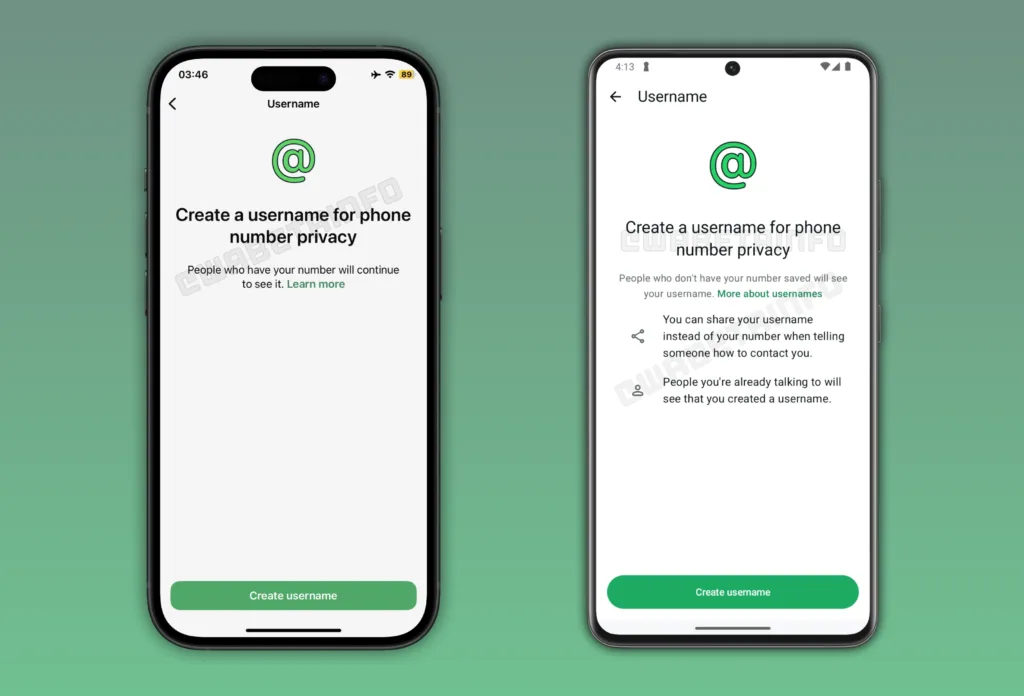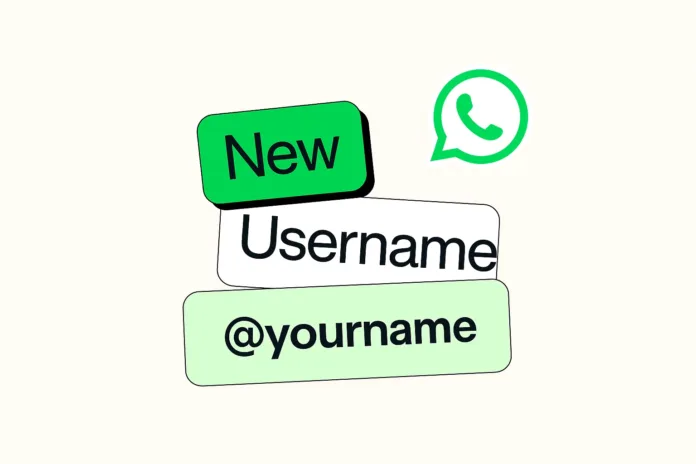Table of Contents
WhatsApp is preparing a historic change in how users and businesses identify each other: a shift from phone numbers to usernames as a primary identity layer. The company is actively testing a system that allows people to chat and call without sharing their phone numbers, improving privacy and reducing unwanted exposure. Recent updates inside WhatsApp’s Android builds suggest usernames are moving closer to broader rollout, with 2026 expected to mark their mainstream adoption. This update is officially part of Meta’s broader roadmap for WhatsApp, modernizing user identity while maintaining encryption and privacy protections.
Read More About Our Article of WhatsApp Finally Arrives on Apple Watch: Full Messaging, Features, and Future Plans Published on November 6th, 2025 SquaredTech
WhatsApp Username Feature: Privacy Without Phone Numbers
The username feature changes how identity works inside WhatsApp. Instead of depending on a user’s phone number, the app will allow people to be found and contacted through a unique username. That username will serve as the new way to start conversations or calls, all while keeping real contact information private. This means WhatsApp will allow communication using a username instead of a phone number, similar to modern social platforms but built with end-to-end encryption.
In the beta version for Android 2.25.33.2, testers already noticed this feature in action. It allows both voice and video calls to be made using a username rather than a number. For users, this means they can reach new contacts securely, and for businesses, it marks a key step toward privacy-focused customer interactions.
From an editorial view, this feature is more than just a convenience. It represents WhatsApp’s ongoing strategy to modernize communication standards, ensuring privacy remains central to every technical upgrade.
Why the Username Update Took Years to Develop
While the idea of usernames may sound simple, implementing it inside a system that serves over two billion users worldwide required a major engineering overhaul. WhatsApp’s architecture has historically tied all identity and encryption mechanisms to phone numbers. Replacing that foundation meant rebuilding key layers of the app from scratch.
According to developers briefed on the project, WhatsApp engineers had to:
- Redesign core database structures to map usernames to existing encryption keys.
- Ensure end-to-end encryption continues to function seamlessly during username-based chats.
- Build compatibility between usernames and business accounts across all existing devices and web platforms.
- Conduct months of privacy validation and penetration testing to ensure no data leaks could occur during username lookups.

The effort has taken longer than many expected, but our team’s review of WhatsApp’s documentation indicates that the system is now entering its final phase of testing. Businesses have recently been notified about the upcoming changes, which include new identifiers for messaging systems, signaling that the full launch may not be far away.
WhatsApp’s Latest Confirmation: Usernames Coming in 2026
In a newly shared update, WhatsApp confirmed that usernames will officially launch next year, aligning with an internal privacy roadmap that extends through mid-2026. The company described usernames as an optional privacy feature that both regular users and business accounts can adopt.
While the announcement primarily targeted Business API partners, it’s clear from WhatsApp’s documentation that usernames will be available for all users simultaneously. This shared rollout ensures that both sides of a conversation, businesses and customers can adopt the same privacy framework from day one.
For WhatsApp, the introduction of usernames represents a milestone similar to the 2016 rollout of end-to-end encryption. For users, it’s a way to engage confidently without exposing their contact information. And for businesses, it provides a more controlled and compliant method to manage customer relationships.
Our team observes, this change redefines how digital identity functions inside a global messaging platform. It emphasizes privacy not as an optional extra, but as a built-in expectation.
Understanding WhatsApp’s New Business-Scoped User ID
Alongside usernames, WhatsApp is introducing another technical upgrade, the Business-Scoped User ID (BSUID). This identifier is assigned automatically to each WhatsApp user and allows businesses to interact with customers without storing or relying on their phone numbers. BSUID (Business-Scoped User ID) is WhatsApp’s new internal identifier that lets businesses message users securely without relying on visible phone numbers.
Every BSUID is linked to a user_id parameter and is included in message webhooks, whether or not the user has activated the username feature. In simpler terms, businesses using WhatsApp’s Business API will still be able to identify and communicate with users securely, even if phone numbers are hidden.
For developers, this means updating their CRM systems, support bots, and message routing tools to handle BSUIDs. The field will appear in webhook notifications and remain compatible across current and future API versions.
Here’s how the transition works in practice:
| Feature | Description | Impact |
|---|---|---|
| Username | Public-facing name for chats and calls | Protects personal numbers |
| BSUID | Hidden internal identifier for businesses | Enables secure messaging |
| Deadline | June 2026 | Businesses must update systems |
This dual approach ensures that privacy doesn’t come at the expense of functionality. Businesses can still maintain seamless communication while users keep control over personal information.
Our analysis shows that this structure mirrors modern privacy frameworks used by enterprise grade platforms, where identifiers are anonymized but traceable within controlled systems.
The Countdown to June 2026: What Businesses Must Do
WhatsApp has issued a clear deadline, all business systems must support usernames and BSUIDs by June 2026. That gives developers roughly seven months to prepare once the final update becomes available.
Businesses using the WhatsApp Business API should:
- Audit their systems to identify any dependencies on phone numbers.
- Update CRM tools and analytics dashboards to support usernames and BSUIDs.
- Test message routing workflows using the new identifiers.
- Review automated customer support systems to ensure they recognize both identifiers.
- Train teams to manage username-based communication securely.
WhatsApp’s developer documentation already provides detailed integration guides and code examples. The platform has also urged early adoption to prevent communication disruptions once usernames become mandatory.
From our perspective, proactive adaptation is essential. Businesses that upgrade early will not only avoid service interruptions but also gain a competitive advantage by presenting themselves as privacy-conscious brands.
How Usernames Strengthen Customer Privacy and Trust
For years, users have expressed discomfort about having to share personal numbers during customer service interactions. WhatsApp’s username update directly addresses that issue. By allowing people to message and call businesses through usernames, the company is effectively removing one of the biggest barriers to digital engagement.
Customers can now contact businesses safely without revealing private details. This helps create a more open communication environment where users feel in control. At the same time, businesses benefit from improved engagement rates since potential customers are more likely to reach out when anonymity is protected.
From an editorial angle, we see this as a major cultural shift in messaging behavior. Just as email addresses replaced physical contact in early internet communication, usernames could soon replace phone numbers as the digital identity standard in messaging.
Moreover, usernames help businesses develop brand recognition. A consistent username is easier to remember and can reflect a company’s identity far better than a numeric contact. Over time, usernames could even become searchable identifiers that connect users directly to verified business profiles, improving trust and reducing impersonation risks.
A Privacy-Focused Future for WhatsApp
WhatsApp’s latest move fits into a broader trend of privacy-first digital communication. The company’s emphasis on usernames and BSUIDs shows a deliberate effort to balance convenience, security, and control.
According to internal projections reviewed by our team, the option to reserve usernames could start rolling out as early as the first half of 2026, giving users time to claim preferred names before the full feature launch.
While the initial focus is on businesses, individual users will gain the same protections and benefits. This dual implementation ensures that privacy improvements extend across the entire ecosystem rather than remaining a premium feature for commercial users.
For developers, the transition period will serve as a test phase to optimize performance and eliminate bugs before usernames are activated at scale. For WhatsApp, it marks another major milestone in its mission to evolve beyond traditional contact-based communication.
Read More About Our Article of WhatsApp’s New AI Summarizer Could Be Reading More Than Just Your Messages Published on July 21st, 2025 SquaredTech
Final Analysis
The upcoming WhatsApp username feature and Business-Scoped User ID represent a foundational shift in how digital identities operate inside one of the world’s most widely used messaging platforms. By 2026, both individuals and organizations will be communicating through identifiers that prioritize privacy and trust.
For users, this means a safer and simpler chat experience. For businesses, it signals a new standard in customer data handling and communication efficiency. And for the industry at large, it establishes WhatsApp as a leader in privacy-forward messaging design.
All current signals indicate that usernames and phone-number-free messaging will become standard across WhatsApp in 2026, ensuring both individual users and businesses adopt this privacy-forward system simultaneously.
Stay Updates: Mobile


